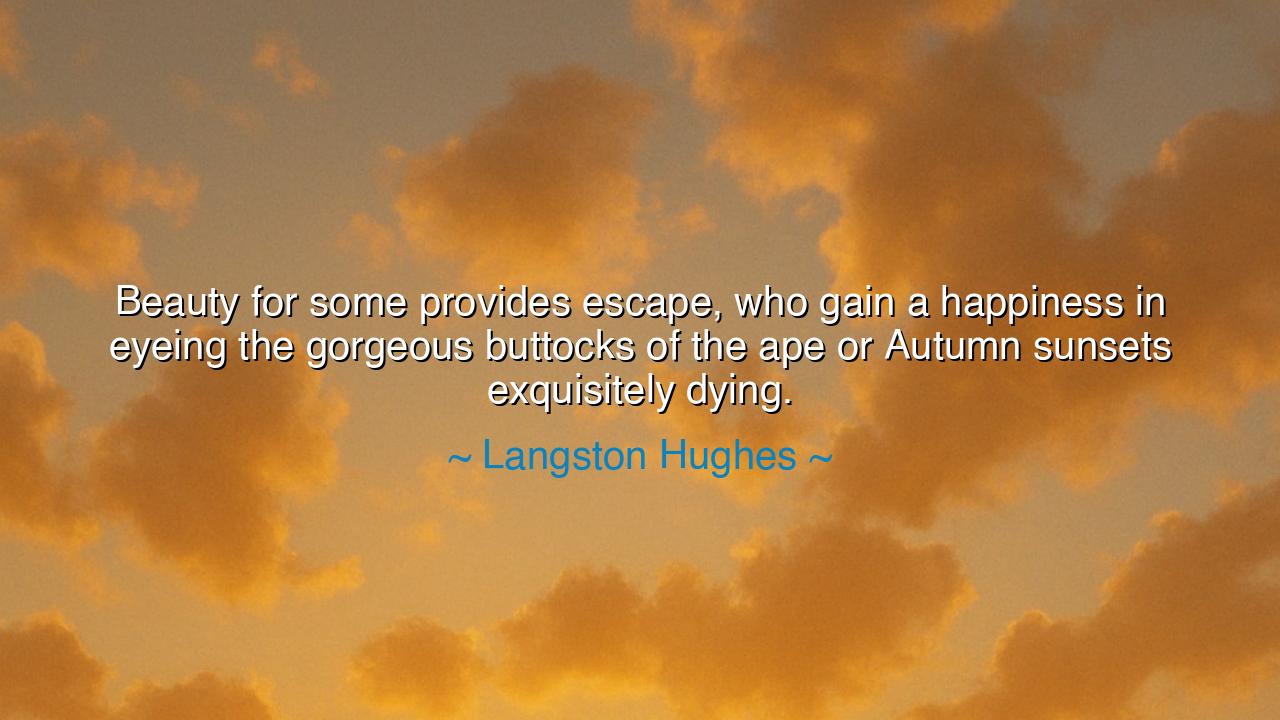
Beauty for some provides escape, who gain a happiness in eyeing
Beauty for some provides escape, who gain a happiness in eyeing the gorgeous buttocks of the ape or Autumn sunsets exquisitely dying.






There are few poets who gazed upon the world with the depth and candor of Langston Hughes, that voice of soul and sorrow, whose words danced between the shadows of pain and the light of truth. In his line, “Beauty for some provides escape, who gain a happiness in eyeing the gorgeous buttocks of the ape or Autumn sunsets exquisitely dying,” Hughes reveals a paradox of the human spirit — that beauty, though fleeting, has the power to heal, distract, or awaken. It is both a mirror and a refuge, a song we sing to forget the noise of suffering, or to remember what is still pure amidst ruin. The ancients would have understood him well, for they too knew that beauty is the soul’s last defense against despair.
To some, beauty is escape — a balm for wounds too deep to speak of. When the world becomes harsh, when injustice gnaws at the heart, the sight of something wondrous — the curve of a mountain, the laughter of a child, the glow of a sunset — can restore one’s belief that life is still sacred. Hughes, who lived through the heat of racial struggle and the bitterness of inequality, understood this deeply. For him, to see beauty in even the crude or the absurd — “the gorgeous buttocks of the ape” — was an act of rebellion. It was saying: Even in the lowliest, I will find wonder. Beauty became not escape from truth, but a doorway to endurance. In beholding it, man remembers that life, however scarred, still holds divine artistry.
Yet beauty is not always gentle. Hughes contrasts the comic with the tragic — the grotesque ape against the dying autumn sunset — to show that beauty itself is bound to death. The sunset’s splendor lies in its ending, its slow surrender to night. This, too, the wise have always known: that the sweetest things are often the briefest. In Japan, the cherry blossoms bloom only to fall; in Greece, the heroes were beautiful only in their doom. So too does Hughes teach that beauty and mortality are lovers, eternally entwined. To gaze upon beauty is to glimpse what is dying — and to find joy in it, despite the sorrow.
Think of Vincent van Gogh, who, tormented by loneliness and despair, found his salvation not in the world’s approval but in its colors. His sunflowers burned with the light of his longing, his starry skies swirled with divine restlessness. For him, beauty was an escape from torment, yet also an embrace of truth — the only way to give his anguish form and meaning. Like Hughes, van Gogh knew that beauty could not erase pain, but it could transform it into art, into something luminous. Thus, through beauty, man does not flee reality — he redeems it.
Hughes also reminds us of the diversity of the human eye. Some see beauty in the sublime, others in the absurd. The poet does not mock this — he celebrates it. For in truth, the perception of beauty is the mark of the living soul. Even when the world is cruel, when faith is shaken, the ability to see beauty — in laughter, in decay, in the strange play of existence — means that hope still breathes. The gorgeous buttocks of the ape become a symbol of this enduring humor, the refusal to be crushed by life’s ugliness. The poet whispers to us: “Find beauty, even in what others scorn, for that is the way of survival.”
In these lines, beauty becomes resistance — a weapon against despair, a reminder that joy is a choice. To the ancient Greeks, beauty (kalos) was bound to virtue (agathos); to see the beautiful was to touch the good. Hughes revives that same faith, even in a world that had betrayed him. He does not flee reality — he transforms it through vision. The Autumn sunset may be dying, but its final fire lights the sky. So too can our spirits blaze, even as we fall, leaving behind a trail of radiance.
And so, dear listener, the teaching is clear: seek beauty not to forget, but to remember. Let it not be mere escape, but awakening. When the world wearies you, do not turn from it — instead, find the shimmer within it. Gaze upon the humble and see its strange glory. Watch the sunset not with sorrow for its end, but gratitude for its gift. In doing so, you will learn the sacred art of seeing — the art that turns pain into poetry, and mortality into meaning. For as long as the heart can behold beauty, hope will never truly die.






AAdministratorAdministrator
Welcome, honored guests. Please leave a comment, we will respond soon